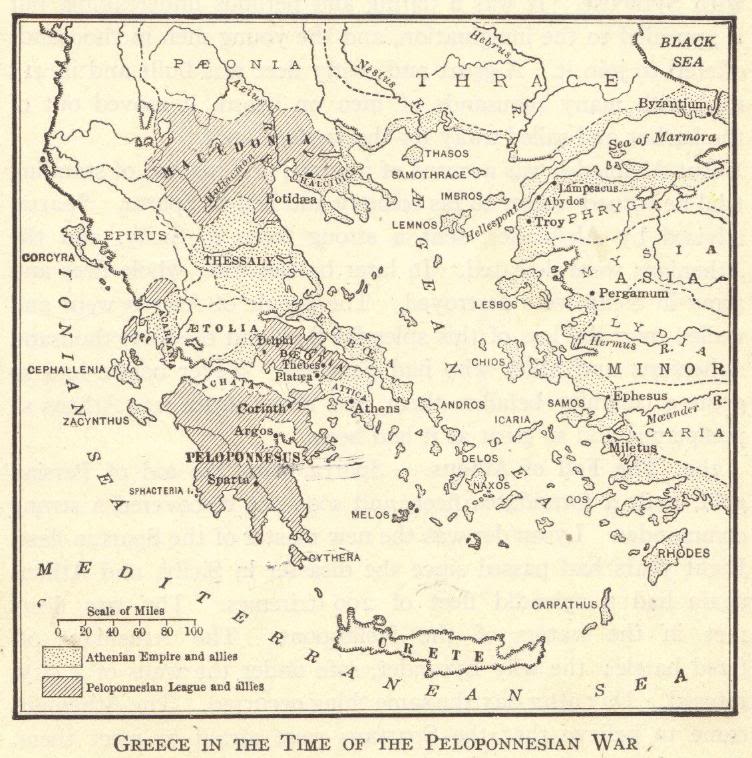| Peloponnesian War Map |
| www.studenthandouts.com > World History > Ancient Greece > Images of Ancient Greece |
 |
|
Map of Greece in the time of the Peloponnesian War: The Peloponnesian War involved the Greek city-states of the Peloponnesus (the Greek peninsula), and occurred from 431 until 404 B.C.E. The Peloponnesian League (led by Sparta) defeated the Delian League (led by Athens). The Peloponnesian War was highly significant in ancient Greek history for several reasons. Athens vs. Sparta: The war was primarily a conflict between two powerful Greek city-states: Athens and Sparta. These two city-states represented different political systems and values. Athens was a democracy, a center of culture and intellectual thought, while Sparta was an oligarchy, known for its military strength and discipline. The war pitted these contrasting city-states against each other, highlighting the ideological and political differences between them. Long Duration: The Peloponnesian War was one of the longest and most protracted conflicts in ancient Greece, lasting for 27 years, from 431 to 404 BCE. Its duration and the shifting fortunes of both sides made it a defining event in Greek history. Thucydides' Account: The historian Thucydides wrote a detailed and influential account of the Peloponnesian War in his work History of the Peloponnesian War. His writings provide valuable insights into the causes, conduct, and consequences of the war. Thucydides' analysis of human nature, power politics, and the complexities of war continues to be studied in political science and history. Impact on Greece: The war had a devastating impact on the Greek world. Both Athens and Sparta suffered significant losses, including loss of life, destruction of infrastructure, and economic hardships. The war weakened many Greek city-states, making them susceptible to outside influences, particularly from the rising power of Macedonia. Shifts in Power: The Peloponnesian War resulted in shifts in power and influence within the Greek world. Athens, which had been a dominant naval and cultural power, was significantly weakened by the war. Sparta emerged as the leading Greek city-state but was unable to maintain a lasting hegemony. The war ultimately paved the way for the rise of Philip II of Macedonia and his son, Alexander the Great. End of Greek Independence: The Peloponnesian War contributed to the weakening of Greek city-states and their ability to act independently. The political and military fragmentation of Greece made it more vulnerable to outside threats, and it marked the beginning of the end of Greek independence. Cultural and Intellectual Impact: Despite the hardships of the war, it did not extinguish the flourishing of Greek culture and intellectual thought. Many of the great philosophical and dramatic works of ancient Greece were produced during this time, illustrating the resilience of the human spirit in the face of adversity. Lessons for Future Generations: The Peloponnesian War has continued to serve as a case study for scholars, military strategists, and policymakers throughout history. Its complexities and the lessons learned from it are still relevant in the study of war, diplomacy, and international relations. The Peloponnesian War remains a pivotal event in Greek history, offering insights into the dynamics of power, politics, and human behavior, and its consequences had a profound and lasting impact on the ancient Greek world. |
 |
 |
 |
 |
 |
 |
|---|
| Ancient Greece Books and Films | Ancient Greece Outlines and PowerPoints |
| Ancient Greece Maps and Pictures | Ancient Greece Study Games |
| Ancient Greece Miscellany | Ancient Greece Worksheets |
| www.studenthandouts.com > World History > Ancient Greece > Images of Ancient Greece |






